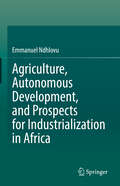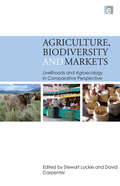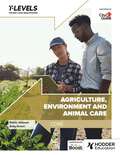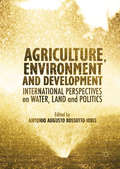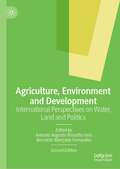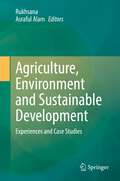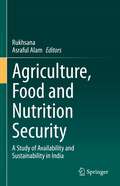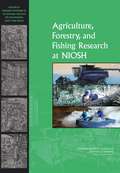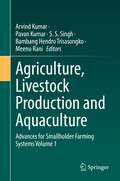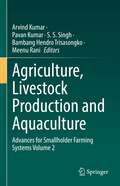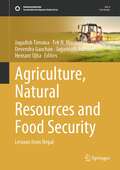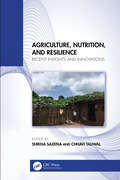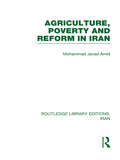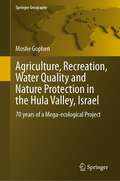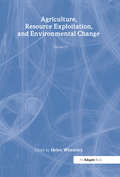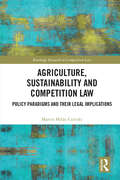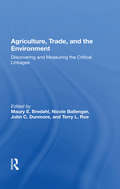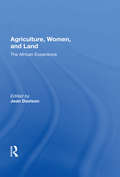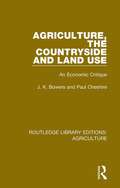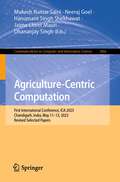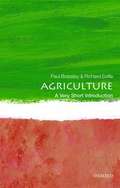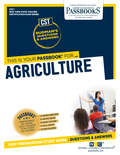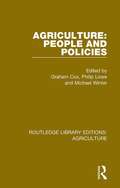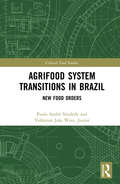- Table View
- List View
Agriculture, Autonomous Development, and Prospects for Industrialization in Africa
by Emmanuel NdhlovuThe book investigates the intersection of agriculture and development in Africa and how it impacts rural industrialisation prospects. It provides a comprehensive view of the position of agriculture in African socio-economic activities and the agricultural sector's potential as the source for continental development and industrialisation prospects. Significant research has been done on African development with a focus placed on the problematic role played by slavery, colonialism and later by incompetent African leaders who failed to steer development of the type that delivers a progressive, sustained and sustainable transformation of lives and societies. There is limited focus on the possibility of agriculture being the potential basis of African development and the chance for industrialisation. This is a matter of concern, considering the dominance of agriculture as a livelihood and income source for many people on the continent. In contributing to the debate on development in Africa, this book aims to show how agriculture can serve as the basis for African development and industrialisation. This will be achieved by (i) providing a detailed historical description of the position of agriculture in African socio-economic activities, (ii) outlining the trajectory of African development with a focus on agriculture, innovation, and mechanisation, (iii) identifying challenges to the development of African agriculture, (iv) exploring the opportunities for agricultural development in Africa, and (v) providing practical and policy recommendations to improve African agriculture and make it the engine for development and industrialisation. Utilising a multidisciplinary approach which combines political economy, social policy, financial inclusion, and empowerment approaches, the book also shows how engagement of youth and women, digitalisation, and the provision of support (by public and private actors) can jump-start agriculture as the engine of African development and industrialisation. Taken together with this conscious effort to promote a multi-disciplinary discussion, the book is valuable reading for students, policymakers, and activists interested in emerging new directions in African development thinking and research.
Agriculture, Biodiversity and Markets: Livelihoods and Agroecology in Comparative Perspective
by Stewart Lockie David CarpenterDebate about how best to ensure the preservation of agricultural biodiversity is caught in a counter-productive polemic between proponents and critics of market-based instruments and agricultural modernisation. This book argues that neither position does justice to the range of strategies that farmers use to manage agrobiodiversity and other livelihood assets as they adapt to changing social, economic, and environmental circumstances. Chapters explore relationships between the exploitation and conservation of agricultural biodiversity and the livelihoods of agricultural communities, and evaluate the capacity of national and multilateral institutions and policy settings to support the protection and capture by communities of agrobiodiversity values. The place of ecosystem services in valuing biodiversity in the marketplace is emphasized. A number of authors assess the potential for market-based instruments and initiatives to encourage the protection of biodiversity, while others compare agrobiodiversity/community relationships, and the effectiveness of instruments designed to enhance these, across international boundaries. The book takes a comparative approach, drawing on empirical case studies from across the developed and developing worlds. In doing so, the book does not simply point to similarities and differences in the experience of rural communities. It also shows how global trade and multilateral institutions bring these otherwise disparate communities together in networks that exploit and/or preserve agrobiodiversity and other resources.
Agriculture, Environment and Animal Care T Level: Core
by Sally Green Robin JacksonGrow your knowledge, understanding and skills as you begin your path to a career in Agriculture, Environment and Animal Care.Created in association with City & Guilds and written by experienced practitioners Robin Jackson and Sally Green, this accessible T Level textbook provides comprehensive coverage of the core content, guiding you through the key topics, terminology and practices included in the qualification.- Build your knowledge of the core T Level content, including challenging topics such as business, finance, sustainability and ethics, plus content for several core pathways- Stay on track throughout the course, using the learning objectives at the start of each chapter and the 'Test Yourself' questions throughout- Improve your understanding of industry terminology with key terms defined clearly throughout- Develop a deeper understanding of each topic with case studies and varied activities, which help to contextualise the content within the industry- Feel confident ahead of assessment with practice questions to consolidate your knowledge and providing opportunities to test your skills
Agriculture, Environment and Animal Care T Level: Core
by Sally Green Robin JacksonGrow your knowledge, understanding and skills as you begin your path to a career in Agriculture, Environment and Animal Care.Created in association with City & Guilds and written by experienced practitioners Robin Jackson and Sally Green, this accessible T Level textbook provides comprehensive coverage of the core content, guiding you through the key topics, terminology and practices included in the qualification.- Build your knowledge of the core T Level content, including challenging topics such as business, finance, sustainability and ethics, plus content for several core pathways- Stay on track throughout the course, using the learning objectives at the start of each chapter and the 'Test Yourself' questions throughout- Improve your understanding of industry terminology with key terms defined clearly throughout- Develop a deeper understanding of each topic with case studies and varied activities, which help to contextualise the content within the industry- Feel confident ahead of assessment with practice questions to consolidate your knowledge and providing opportunities to test your skills
Agriculture, Environment and Development: International Perspectives on Water, Land and Politics
by Antonio A.R IorisThis book deals with past legacies and emerging challenges associated with agriculture production, water and environmental management, and local and national development. It offers a critical interpretation of the tensions associated with the failures of mainstream regulatory regimes and the impacts of global agri-food chains. The various chapters include conceptual and empirical material from research carried out in Brazil, India and Europe. The assessment takes into account the dilemmas faced by farmers, companies, policy-makers and the international community related to growing food demand, water scarcity and environmental degradation. The book also questions most government reactions to those problems that tend to reproduce old, productivist approaches and are normally under the powerful influence of global corporations, mega-supermarkets and investment funds. Its overall message is that the trajectory of agriculture, rural development and environmental management are integral elements of the broader search for justice and novel socio-ecological thinking.
Agriculture, Environment and Development: International Perspectives on Water, Land and Politics
by Antonio Augusto Rossotto Ioris Bernardo Mançano FernandesThe Second Edition of this book is completely revised and updated throughout providing an overview of current challenges faced within the area of Agri-food in relation to policymaking, ecological conservation and socio-environmental justice. Including a range of new chapters, the book explores some of the conceptual and analytical gaps that are presented by current approaches to this topic. The series of interconnected chapters offers a critical reinterpretation of the tensions associated with the failures of mainstream regulatory regimes, land and resource grabbing, and the impacts of global agri-food chains at local, regional and inter-sectoral scales. The book also examines past legacies and emerging challenges associated with agriculture modernisation, politico-spatial disputes, climate change, social movements, gender, ethnicity and education. It likewise addresses the transformative potential of different combinations of biophysical, socio-technical and socio-spatial practices of food sovereignty.
Agriculture, Environment and Sustainable Development: Experiences and Case Studies
by Rukhsana Asraful AlamThis volume is intended to provide a comprehensive understanding of recent innovations related to the study of agricultural and environmental management for sustainable development. The book clearly identifies why the fight to achieve sustainable development in agricultural production must be fought along a broad multidisciplinary front to overcome issues such as soil erosion, poor water quality, pesticide contamination, and food insecurity. Readers are given a broad exposition of the trends and current practices of basic principles on sustainable agriculture, along with a detailed understanding of the use of sustainable agriculture to develop environmentally sustainable food production systems. The chapters describe the ecological sustainability of agricultural systems, current innovations to improve efficiency in the use of resources for sustainable agriculture, and the proposal for technological options and new areas of research in this very significant field of agriculture. The authors aim to provide readers with a good subject understanding which will assist in the identification of agricultural development, environmental risk, sustainable resource management and design of appropriate responses. This book will be very helpful for students, researchers and practitioners interested in the fields of agriculture, environment and sustainable development.
Agriculture, Food and Nutrition Security: A Study of Availability and Sustainability in India
by Rukhsana Asraful AlamThis volume provides an interdisciplinary collection of studies that cover the trends and issues related to agricultural productivity and availability, food and nutrition security, and sustainability in India. The book discusses a broad range of vital issues concerning the production and consumption of food during the era of climate change, and has been prepared to generate awareness of these issues in a large agricultural economy to shed light on new perspectives and solutions to achieve sustainable food production and security in India. The book is organized into three major sections: Climate and Agricultural Productivity for Availability, Changes and Trends in Cropping Patterns and Food Security, and Food and Nutrition Security for Sustainable Development. The book will be of interest to students, researchers, policymakers, and other inquisitive readers interested in different aspects of agriculture, food and nutrition security, and sustainable development.
Agriculture, Forestry, and Fishing Research at NIOSH: Reviews of Research Programs of the National Institute for Occupational Safety and Health
by National Research Council of the National AcademiesThe agriculture, forestry, and fishing sectors are the cornerstone of industries that produce food, fiber, and biofuel. The National Institute for Occupational Safety and Health (NIOSH) conducts research in order to improve worker safety and health in these sectors. This National Research Council book reviews the NIOSH Agriculture, Forestry, and Fishing Program to evaluate the 1) relevance of its work to improvements in occupational safety and health and 2) the impact of research in reducing workplace illnesses and injuries. The assessment reveals that the program has made meaningful contributions to improving worker safety and health in these fields. To enhance the relevance and impact of its work and fulfill its mission, the NIOSH Agriculture, Forestry, and Fishing Program should provide national leadership, coordination of research, and activities to transfer findings, technologies, and information into practice. The program will also benefit from establishing strategic goals and implementing a comprehensive surveillance system in order to better identify and track worker populations at risk.
Agriculture, Livestock Production and Aquaculture: Advances for Smallholder Farming Systems Volume 1
by Arvind Kumar Pavan Kumar Meenu Rani S. S. Singh Bambang Hendro TrisasongkoThis two-volume set discusses recent approaches and technological innovations for sustainable agriculture in smallholder farming systems impacted by climate change. The systems covered include crop-based agricultural production, as well as aquaculture and livestock production as related systems using similar techniques to combat food security issues brought about by climate change and resource overuse. The chapters detail innovations involving crop diversification, soil resilience management, geoinformatics and land suitability monitoring for smart farming, information technology in livestock production, and nutrient resource management in fishery aquaculture. Researchers, practitioners and industries will be able to use this information to implement socially and economically sustainable practices to achieve food security in impoverished areas vulnerable to climate change, while also learning about the rapid evolution in information technology that is applicable for and available to small holder farmers. Volume 1 focuses on current innovations in agricultural and livestock practices in response to climate change. It covers the technological challenges, approaches and mitigation strategies encountered by both scholars and practitioners working in livestock and agricultural production systems impacted by climate change.
Agriculture, Livestock Production and Aquaculture: Advances for Smallholder Farming Systems Volume 2
by Arvind Kumar Pavan Kumar Meenu Rani S. S. Singh Bambang Hendro TrisasongkoThis two-volume set discusses recent approaches and technological innovations for sustainable agriculture in smallholder farming systems impacted by climate change. The systems covered include crop-based agricultural production, as well as aquaculture and livestock production as related systems using similar techniques to combat food security issues brought about by climate change and resource overuse. The chapters detail innovations involving crop diversification, soil resilience management, geoinformatics and land suitability monitoring for smart farming, information technology in livestock production, and nutrient resource management in fishery aquaculture. Researchers, practitioners and industries will be able to use this information to implement socially and economically sustainable practices to achieve food security in impoverished areas vulnerable to climate change, while also learning about the rapid evolution in information technology that is applicable for and available to small holder farmers. Volume 2 focuses on trends and technologies in food security within the context of sustainable practices, drone technology, microwave data, molecular farming, machine learning, agricultural economics, spatial modeling and agricultural policy. These chapters discuss advancements in fishery resource and aquaculture practices, and also the challenges facing these areas due to climate change.
Agriculture, Natural Resources and Food Security: Lessons from Nepal (Sustainable Development Goals Series)
by Jagadish Timsina Tek N. Maraseni Devendra Gauchan Jagannath Adhikari Hemant OhjaThis book explains how a former net food exporting Nepal has become a net food importing country due to a lack of an integrated system-wide approach to planning and governance of agriculture and natural resources. It demonstrates how various components of the food system, such as agronomy, agrobiodiversity, plant health, post-harvest management, livestock and fisheries, and socio-economics including marketing and trade, have been managed in sectoral silos, crippling the very foundations of food systems innovations. The book also explores ways to tackle climate change impacts while considering gender, social equity, conservation agriculture practices, and crop modeling as cross-cutting themes. This book utilizes Nepal as a case study in relation to wider questions of food security and livelihoods facing South Asia and synthesizes lessons that are relevant to the Global South where countries are struggling to harmonize and integrate natural resources management for sustainable and effective food security outcomes. As such, it significantly contributes to the knowledge toward achieving various United Nations Sustainable Development Goals.
Agriculture, Nutrition, and Resilience: Recent Insights and Innovations
by Shikha Saxena Chhavi TaliwalThis book aims to provide a comprehensive analysis of food security by exploring the interconnections between agricultural practices, nutritional status, socioeconomic factors, and technological advancements. It addresses the challenges posed by population growth, climate change, and socioeconomic disparities, focusing on sustainable agriculture, equitable access to food, and community resilience. The book integrates insights from multilevel modeling, structural equation modeling, and case studies to highlight effective strategies for combating malnutrition, promoting gender equality, and enhancing food systems. It also emphasizes the importance of policy interventions, community engagement, and innovative technologies in fostering a sustainable, resilient, and equitable global food landscape.Key features Multidisciplinary Approach: Integrates nutrition, agriculture, economics, and gender studies to offer a comprehensive view of food security challenges and solutions. Advanced Analytical Methods: Employs multilevel modeling and structural equation modeling to identify key factors affecting child nutrition and the impact of agricultural productivity. Focus on Gender Equality: Highlights the critical role of women's health and empowerment in improving food systems and achieving sustainable development goals. Practical Solutions: Proposes actionable strategies such as rice fortification and millet promotion, tailored to diverse socioeconomic and climatic conditions. Holistic Framework: Combines theoretical insights with real-world applications to create a sustainable, resilient, and equitable global food system. The target audience for this book includes researchers, policymakers, public health professionals, agricultural and environmental scientists, NGOs, community leaders, students, educators, and development agencies. It provides insights into food security, sustainable agriculture, nutrition, gender equality, and community engagement, making it valuable for those involved in related fields and initiatives.
Agriculture, Poverty and Reform in Iran (Routledge Library Editions: Iran)
by Mohammad Javad AmadAs in many developing countries, the prospects for land reform in Iran seemed promising. It was expected to improve rural poverty and stimulate agricultural development by replacing the traditional landlord-peasant system with more peasant-biased, modern farming. This book assesses the economic consequences of land reform, focusing particularly on its effect on the living standards of the rural poor. Amid describes a ‘biomodal’ system of large and small farms that emerged after the reform. Large farms, with government support, modernized and grew more profitable cash crops, whereas small farms found difficulty in obtaining credit and continued to rely on traditional techniques and staple food crops. Land reform was not, the author argues a success for the majority of the Iranian rural population who experienced virtually no improvement in living standards and a growth of rural inequality as a result.
Agriculture, Recreation, Water Quality and Nature Protection in the Hula Valley, Israel: 70 years of a Mega-ecological Project (Springer Geography)
by Moshe GophenThe anxious search for agricultural income resources, and assurance of the national water supply in the northern newly created state of Israel initiated the national project of the Hula Drainage. The implementation of this project was accompanied as of today by research and monitoring of the ecological trait aimed at crop harvest improvement in the Hula valley and prevention of water quality deterioration in Lake Kinneret. Forty years later a reclamation project to improve the peat soil property and renovate the hydrological system was carried out. This book documents the scientific research carried out during this mega-ecological project. Several issues of the ecological renovation and its impact on the Hula valley management and water quality in lake Kinneret are presented in this book. The advantage and contribution of a newly created shallow lake Agmon-Hula to nutrient dynamics, and hydrological control, accompanied by avian presence, (among others, Cranes, Storks, Pelicans, Flamingoes) and plants renewal which enhanced, tourism; potential impact of nitrogen and sulfate migration from the Hula valley on the Kinneret water quality; the role of climate change on the ecology of the Hula Valley and the Kinneret nutrient availabilities and phytoplankton community; the subterranean migration of water and nutrients and water loss. Further proposals for future development are under consideration. This book presents a comprehensive practical management implementation of a long-term ecological project. Results of scientific and monitoring research which followed the project implementation benefit the international and national communities.
Agriculture, Resource Exploitation, and Environmental Change (An Expanding World: The European Impact on World History, 1450 to 1800 #17)
by Helen WheatleyThis volume examines the ecological consequences of European expansion as a result of land use and resource exploitation. These environmental transformations could be as dramatic as the last Ice Age, but scholars have only begun to take full measure of the changes. The articles presented here provide a map of some of the more promising directions of historical research. Major themes include biological exchange, agriculture, extraction of forest and animal resources, interactions between indigenous and European methods of exploitation, and European approaches to regulation and conservation. A useful corrective to the frontier image of Europeans conquering the wilderness, this volume provides a rich picture of the diversity of European interests and the sometimes unexpected consequences of their approaches to the land.
Agriculture, Sustainability and Competition Law: Policy Paradigms and Their Legal Implications (Routledge Research in Competition Law)
by Martin Milán CsirszkiThrough a detailed law-and-policy analysis, this book investigates competition law and policy in relation to agricultural producers, examining the topic in light of both the neoliberal agricultural policy and food sovereignty paradigms, with a focus on their differing approaches to competition and sustainability.This book addresses the increasing pressures faced by agricultural producers, stemming from two major developments: the shift towards neoliberal economic policies in agri-food markets, and the growing recognition of the agricultural sector’s role in environmental degradation due to unsustainable practices. These developments have provoked protests from farmers and prompted critical questions about how different agricultural and competition policy theories navigate the complex relationship between competition, agriculture and sustainability. By conceptualising the connections between each topic, the book comprehensively analyses their interdependence. While competition law experts frequently overlook the realities of the agricultural sector, agricultural scholars may not fully grasp the objectives of competition law. By bridging these divides, the book provides an integrated understanding of competition and agricultural policy, also with a particular focus on sustainability.This book will be of interest to researchers in the field of agricultural law and policy, and competition law and policy, as well as those interested in sustainability.
Agriculture, Trade, And The Environment: Discovering And Measuring The Critical Linkages
by Maury E. Bredahl Nicole Ballenger John C. Dunmore Terry L. RoeIn this timely volume, an international group of economists, trade negotiators, and environmentalists brings diverse perspectives to bear on the contentious issue of international trade and the environment. Providing a conceptual framework to help assess the issues, the contributors discuss three themes: the dimensions of the economic and political
Agriculture, Women, And Land: The African Experience
by Jean DavisonThis book examines gender relations to land relations that are crucial to formulating policies through which African women's food producing capabilities can be advanced. It addresses the need to document historical changes in land tenure practices that have influenced women's household production.
Agriculture, the Countryside and Land Use: An Economic Critique (Routledge Library Editions: Agriculture #4)
by J. K. Bowers Paul CheshireFirst published in 1983. How had the situation developed in which agriculture had become such a creature of state protection, where public money supported prosperous landowners while poor farmers received practically nothing? Where the value of agricultural support exceeded net farm income, and vastly exceeded the level of support available to British Steel or British Rail? In answering these questions John Bowers and Paul Cheshire examined the real value of agricultural support in successive policy phases since the Second World War, and analysed the effects this support had on income distribution. Their thesis was that agricultural change, including the transfer of land from traditional farmers to institutions and corporations, was not the product of impersonal progress, but the direct result of agricultural support policies, resting on specious economic arguments. The authors’ analysis of this subject has inescapable relevance for the policymaker, for the taxpayer and consumer of foodstuffs, for the urban user of the British countryside and indeed for farmers and the farming lobby. Agriculture, the Countryside and Land Use will be an important book for all these groups and also for students of agriculture, geography and economics.
Agriculture-Centric Computation: First International Conference, ICA 2023, Chandigarh, India, May 11-13, 2023, Revised Selected Papers (Communications in Computer and Information Science #1866)
by Dhananjay Singh Jaime Lloret Mauri Mukesh Kumar Saini Neeraj Goel Hanumant Singh ShekhawatThis book constitutes revised selected papers from the First International Conference on Agriculture-Centric Computation, ICA 2023, held in Chandigarh, India, in May 2023.The 18 papers were thoroughly reviewed and selected from the 52 submissions. They examine how computing disciplines such as big data analytics, artificial intelligence, machine learning, the Internet of Things (IoT), remote sensing, robotics, and drones can be applied to agriculture to address some of the biggest challenges facing the industry today, including climate change, food security, and environmental sustainability.
Agriculture: A Very Short Introduction (Very Short Introductions Series)
by Paul Brassley Richard SoffeAgriculture, one of the oldest human occupations, is practised all over the world, using techniques ranging from the profoundly traditional to the most scientifically advanced. How many of us understand what is happening in the fields and think about the origins of the food in our trolley? In this Very Short Introduction, Paul Brassley and Richard Soffe explain what farmers do and why they do it. Beginning with the most basic resource, the soil, they show why it is important, and how farmers can increase its productivity, before turning to the plants and animals that grow on it, and tracing the connections between their biology and the various ways in which farmers work with them. The authors conclude by looking at some of the controversial issues facing contemporary agriculture: its sustainability; its impact on wildlife and landscape; issues of animal welfare; and the affect of climate change and the development of genetically modified organisms on farmers.
Agriculture: Passbooks Study Guide (New York State Teacher Certification Examination Series (NYSTCE) #Nt-20)
by National Learning CorporationThe New York State Teacher Certification Exams (NYSTCE) are required for all candidates seeking licensure in the State. The NYSTCE series consists of many different tests assessing skills and abilities necessary for teachers. The Passbook® for the Content Specialty Test in Agriculture provides hundreds of multiple-choice questions in the areas that will likely be covered on your upcoming certification exam, including but not limited to: plant and soil science; agricultural economics; animal science; and other related areas.
Agriculture: People and Policies (Routledge Library Editions: Agriculture #5)
by Michael Winter Philip Lowe Graham CoxThe structure and future of Britain’s agriculture sector are the central concerns of this volume, first published in 1986. It critically examines the mystique surrounding agriculture which has done much to underpin the special support the industry had enjoyed. The papers collected here address many of the key questions: What is distinctive about the social and economic organisation of agricultural production? What are the main factors which have influenced policy formation? And how are the policy makers likely to respond to widespread concern about the economic and environmental impact of those policies?
Agrifood System Transitions in Brazil: New Food Orders (Critical Food Studies)
by Paulo André Niederle Valdemar João Wesz JuniorThis book explores the agrifood system transitions in Brazil to provide a new understanding of the trajectory of agriculture and rural development in this country. It accentuates the increasing diversifi cation and hybridization of food production and consumption practices throughout history. With a framework that combines convention theory, neoinstitutional approaches and practice theory, this book suggests the concept of “food orders” which represents different arrangements of practices, institutions and sociotechnical artifacts. By exploring the interrelations between these elements, the book looks at six different food orders: industrial, commercial, domestic, aesthetic, civic and fi nancial, in tandem with examples of practices, sectors and territories to understand the dynamics of each one. This aids in understanding the main tendencies of the agrifood sector in such a vast country that, being a major player in global food markets, also affect production and consumption dynamics in several other countries. Besides, this book also seeks to comprehend the current institutional changes in Brazil that may be critical to interpret the global dissemination of populist and autocratic governments. Offering key insights into the contemporary sociology of agriculture and food, this book demonstrates how strengthening democracy and supporting the organization of civil society are major challenges when we think about transition for sustainable food systems.
